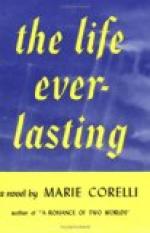Her eyes stared at me so pitifully that I was full of sorrow for her.
“Oh, you poor Catherine!” I said, and taking her hand, I kissed it gently. The tears in her eyes brimmed over.
“They found me lying on the floor insensible,”—she went on, tremulously—“And I was very ill for a long time afterwards. People could not understand it when I broke off my engagement. I told nobody why—except him. He seemed sorry and a little ashamed,—but I think he was more vexed at losing my fortune than anything else. I said to him that I had never thought about being plain,—that the idea of his loving me had made me feel beautiful. That was true!—my dear, I almost believe I should have grown into beauty if I had been sure of his love.”
I understood that; she was perfectly right in what to the entirely commonplace person would seem a fanciful theory. Love makes all things fair, and anyone who is conscious of being tenderly loved grows lovely, as a rose that is conscious of the sun grows into form and colour.
“Well, it was all over then,”—she ended, with a sigh, “I never was quite myself again—I think my nerves got a sort of shock such as the great novelist, Charles Dickens had when he was in the railway accident—you remember the tale in Forster’s ‘Life’? How the carriage hung over the edge of an embankment but did not actually fall,—and Dickens was clinging on to it all the time. He never got over it, and it was the remote cause of his death five years later. Now I have felt just like that,—my life has hung over a sort of chasm ever since I lost my love, and I only cling on.”
“But surely,”—I ventured to say—“surely there are other things to live for than just the memory of one man’s love which was not love at all! You seem to think there was some cruelty or unhappiness in the chance that separated you from him,—but really it was a special mercy and favour of God—only you have taken it in the wrong way.”
“I have taken it in the only possible way,”—she said—“With resignation.”
“Oh, do you call it resignation?” I exclaimed—“To make a misery of what should have been a gladness? Think of the years and years of wretchedness you might have passed with a man who was a merely selfish fortune-hunter! You would have had to see him grow colder and more callous every day—your heart would have been torn, your spirit broken—and God spared you all this by giving you your chance of freedom! Such a chance! You might have made much of it, if you had only chosen!”
She looked at me, but did not speak.
“Love comes to us in a million beautiful ways,”—I went on, heedless of how she might take my words—“The ordinary love,—or, I would say, the ordinary mating and marriage is only one way. You cannot live in the world without being loved—if you love!”
She moved on her pillows restlessly.
“I can’t see what you mean,”—she said—“How can I love? I have nothing to love!”




